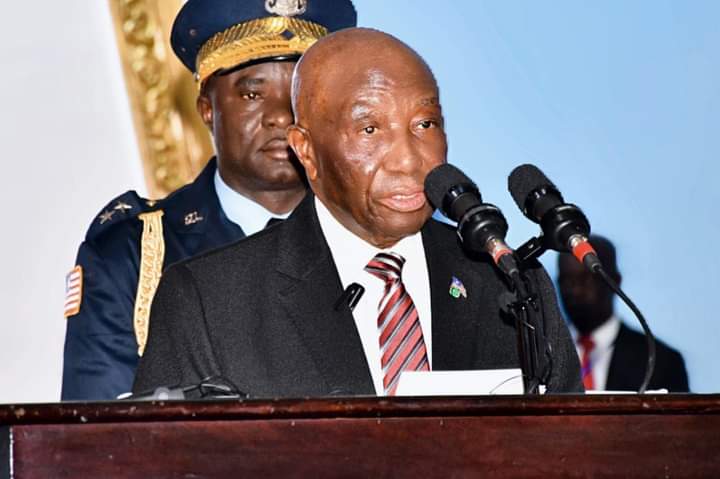President Joseph Boakai’s legacy, despite any future actions, will be indelibly marked by Executive Order 131, establishing the Office of War and Economic Crimes Court. This landmark decision aims to hold accountable those responsible for the atrocities and corruption that have plagued Liberia, transcending political divides. While lauded by many as a crucial step towards justice and national healing, it also stirs anxieties, raising fears of reigniting past tensions and highlighting the long-standing absence of political will to prosecute war criminals, many of whom still hold influential positions. The hope remains that this initiative will mark a turning point, fostering a culture of transparency and adherence to the rule of law.
Prior to this, Boakai signed Executive Order 121, creating the Office of Asset Recovery to reclaim stolen state assets and hold corrupt officials accountable. This initial action fueled optimism, portraying Boakai as a reformer determined to restore integrity and financial stability. However, this early promise has faded into widespread disillusionment. The administration is now criticized for lacking strategic direction and transparency, mirroring the flaws of previous governments. The perceived disconnect between the administration’s calls for austerity and its own spending habits further erodes public trust.
Public discontent has intensified with the swift passage of the 2024 budget, a staggering $738.8 million. The substantial allocation for presidential activities and the provision of expensive SUVs for legislators, juxtaposed against the meager salaries of civil servants, has fueled public outrage. Further exacerbating this frustration are the allocation of $13.2 million for legislative support projects, the controversy surrounding the alleged mismanagement of the NEKOTEH Scholarship program, and the continued presence in office of officials accused of financial misconduct, such as Abdullai Kamara of the LTA and Dorr Cooper of the Ministry of Commerce and Industry. These instances of perceived extravagance and lack of accountability deeply undermine public faith in the government’s commitment to reform.
The growing dissatisfaction with the Boakai administration stems from a confluence of factors. Firstly, the public perceives a stark discrepancy between the administration’s professed commitment to a “rescue mission” and its seemingly lavish spending, fostering resentment. Secondly, the political opposition has intensified its scrutiny, questioning the administration’s integrity and motivations. Finally, even Boakai’s long-time supporters express concern over his apparent reliance on a narrow circle of loyalists from his Unity Party, rather than assembling a team of diverse and highly qualified individuals. This perceived prioritization of political expediency over meritocratic appointments fuels disappointment, particularly considering Liberia’s wealth of human capital.
Critiques of Boakai’s leadership style and cabinet appointments are not unfounded. While acknowledging the presence of a few respected figures, the overall composition of his administration is deemed uninspiring and lacking in the expertise expected of national leaders. Boakai is further criticized for exhibiting a provincial bias in his appointments, reminiscent of his predecessor, George Weah, albeit with a different regional focus. This perceived insularity and lack of a clear national vision contribute to the growing sense of disillusionment.
Perhaps most concerning is the perceived absence of a coherent vision for the country. Despite nearly a year in office, punctuated by numerous international trips aimed at attracting foreign investment, Boakai has yet to articulate a compelling plan for addressing Liberia’s pressing challenges. This lack of direction fuels speculation that he may be more preoccupied with securing a future presidential bid than with tackling the immediate issues of inflation, debt, and insecurity plaguing the nation. While acknowledging the inherited challenges, critics argue that this context cannot excuse the administration’s apparent lack of preparedness and strategic planning. The public’s expectation for effective governance remains, especially in the face of significant socio-economic hardships.
Boakai’s situation reflects a broader trend of disillusionment with leadership across Africa. Citizens across the continent express growing frustration with the perceived disconnect between the opulent lifestyles of those in power and the struggles of the ordinary populace. This disparity fuels the perception that democracy serves merely as a vehicle for elite enrichment, rather than a system of accountable governance. The recent spate of military coups in West and Central Africa underscores the fragility of democratic institutions in the face of such discontent. In this context, Boakai’s perceived indifference to the plight of Liberians carries significant risks, potentially jeopardizing the country’s hard-won stability. He must recognize the urgency of addressing public grievances before disillusionment descends into apathy or, worse, fuels a rejection of democratic principles. The window of opportunity to reclaim public trust and demonstrate a commitment to genuine reform is narrowing, and decisive action is paramount.


